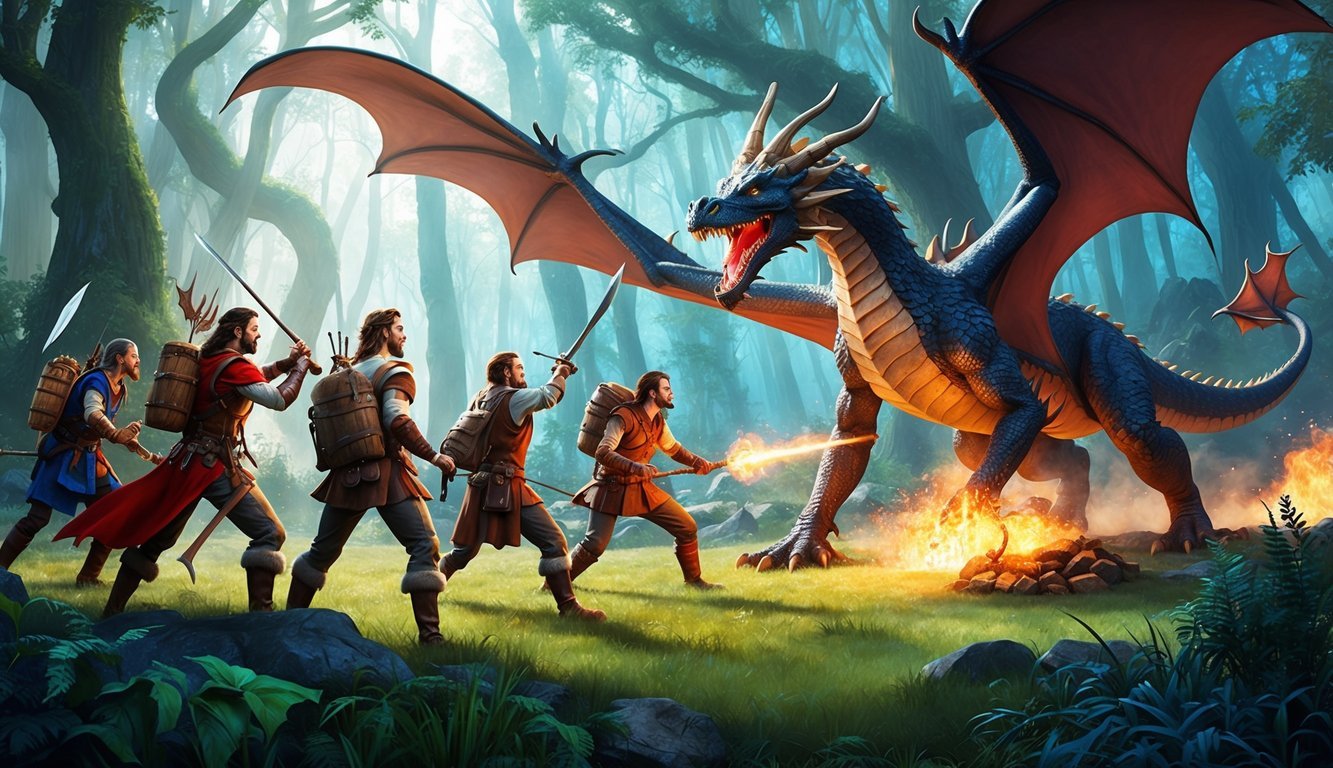Role-playing games transport you to fantastic worlds where your choices shape epic stories.
From sprawling fantasy realms to cyberpunk cityscapes, RPGs let you become the hero of your own adventure.
Whether you prefer turn-based battles or real-time combat, you can find an RPG that will capture your imagination and keep you hooked for dozens of hours.
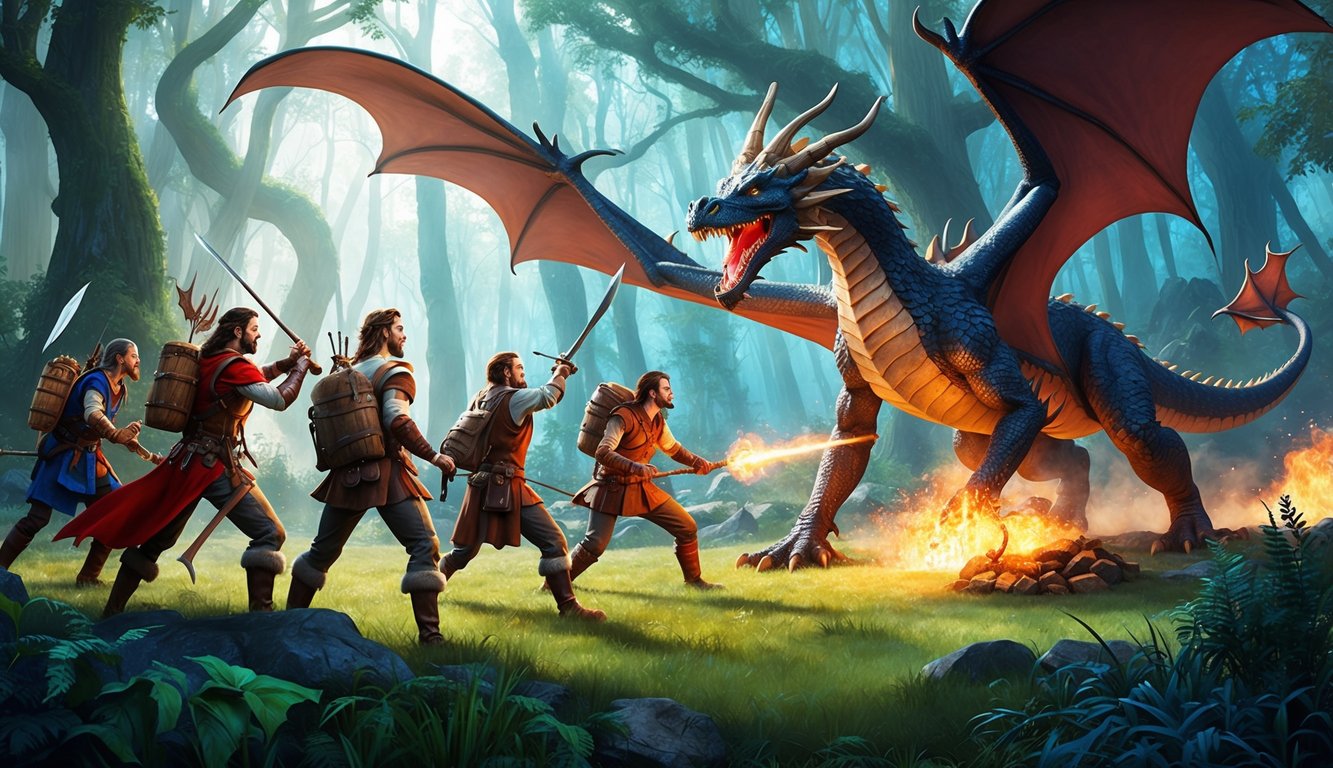
The RPG genre has evolved dramatically over the years.
Classic titles like Chrono Trigger and Skyrim laid the groundwork, while modern masterpieces like The Witcher 3 and Elden Ring push the boundaries of what’s possible.
You’ll find deep character customization, branching narratives, and intricate systems to master.
Looking to dive into a new RPG? You’re spoiled for choice in 2024.
From the highly-anticipated Dragon’s Dogma 2 to indie gems like In Stars and Time, there’s something for every type of player.
Get ready to lose yourself in rich, immersive worlds where your decisions truly matter.
The Essence of Role-Playing Games
Role-playing games immerse you in fantastical worlds where your choices shape the story.
You become the hero, crafting unique characters and embarking on epic quests filled with danger and discovery.
Character Creation and Customization
In RPGs, you breathe life into your avatar.
You pick a race, class, and backstory to define your role in the adventure.
Then, you can tweak your character’s appearance, from hairstyles to facial features.
As you progress, you’ll earn experience points to level up and unlock new abilities.
Distribute skill points to specialize in combat, magic, or social interactions.
Then, equip your hero with powerful weapons and armor.
Some games even let you customize gear colors or add unique engravings.
This deep personalization ensures your character feels truly unique.
Story and Narrative Depth
RPGs excel at storytelling.
You’ll uncover rich plots filled with twists, moral dilemmas, and memorable characters.
Your choices often impact the narrative, leading to multiple endings.
Engage in witty dialogues, form alliances, and make enemies.
Side quests flesh out the world and provide opportunities for character growth.
Some games feature branching storylines, letting you shape the fate of entire nations.
Epic tales of good versus evil are common, but many modern RPGs explore nuanced themes and complex characters.
World Building and Exploration
Step into meticulously crafted fantasy worlds teeming with life.
From sprawling cities to mysterious dungeons, there’s always something new to discover.
Uncover hidden treasures and rare artifacts as you explore every nook and cranny.
Interact with diverse NPCs to learn about local cultures and conflicts.
Some games feature dynamic weather systems and day-night cycles that affect gameplay.
Fast travel options let you quickly revisit favorite locations.
As you progress, you might unlock mounts or vehicles to traverse vast landscapes.
Many RPGs reward thorough exploration with unique gear or story revelations.
Variations in RPG Gameplay
RPGs offer diverse gameplay experiences through different combat systems and player modes.
These variations keep the genre fresh and appealing to a wide range of gamers.
Turn-Based vs. Action Combat
Turn-based combat gives you time to think and strategize.
You take turns with enemies, choosing actions from a menu.
This style is common in classic JRPGs like Final Fantasy and Pokémon.
Action RPGs, on the other hand, test your reflexes.
You control your character in real-time, dodging attacks and striking when you see an opening.
Games like The Witcher 3 and Dark Souls fall into this category.
Some RPGs blend both styles.
The Persona series, for example, uses turn-based combat but adds real-time elements to keep you on your toes.
Solo Adventures vs. Multiplayer Experiences
Single-player RPGs let you immerse yourself in a personal journey.
You’re the hero, making choices that shape the story and world around you.
Games like Skyrim and The Outer Worlds offer vast solo adventures.
Multiplayer RPGs bring social elements to the mix.
You can team up with friends or strangers to tackle challenges together.
MMORPGs like World of Warcraft let you join guilds and participate in massive online worlds.
Some games offer both options.
Divinity: Original Sin 2 shines as a single-player RPG but also supports co-op play for up to four players.
Notable RPG Subgenres
RPGs come in various flavors, each offering unique gameplay experiences.
You’ll find distinct styles that cater to different tastes and preferences within the genre.
The Richness of JRPGs
JRPGs, or Japanese Role-Playing Games, are known for their deep storylines and turn-based combat.
You’ll often encounter sprawling worlds filled with colorful characters and epic quests.
Games like Final Fantasy and Dragon Quest have defined this subgenre.
Key Features of JRPGs:
- Character-driven narratives
- Turn-based battle systems
- Anime-inspired art styles
These games typically focus on a group of heroes saving the world.
You’ll spend hours leveling up your party, customizing abilities, and uncovering plot twists.
The Strategy in CRPGs
CRPGs, or Computer Role-Playing Games, offer a more tactical approach.
You’ll find yourself making crucial decisions that shape the game world and your character’s development.
Popular CRPG Elements:
- Complex character creation
- Isometric viewpoints
- Dialogue trees with multiple outcomes
Games like Baldur’s Gate and Divinity: Original Sin showcase the depth of CRPGs.
You’ll enjoy intricate combat systems and branching storylines that react to your choices.
The Dynamism of ARPGs
Action RPGs (ARPGs) blend role-playing elements with fast-paced combat.
You’ll be in the thick of battle, dodging attacks and unleashing combos in real-time.
ARPG Hallmarks:
- Real-time combat
- Loot-driven progression
- Skill-based gameplay
Titles like Diablo and The Witcher series exemplify this subgenre.
You’ll find yourself constantly on your toes, balancing quick reflexes with strategic character building.
ARPGs often feature expansive skill trees and equipment systems.
You’ll spend time optimizing your build to tackle increasingly challenging foes.
Influential Role-Playing Games
RPGs have come a long way since their early days.
From pioneering classics to modern masterpieces, these games have shaped the genre and captivated players for decades.
Classics That Shaped the Genre
Remember Rogue? This 1980 gem kickstarted the “roguelike” subgenre.
You’d explore randomly generated dungeons, fighting monsters and collecting loot.
It’s still inspiring games today!
Diablo 3 took hack-and-slash RPGs to new heights.
You’d click your way through hordes of demons, chasing that sweet, sweet loot.
It spawned countless imitators like Path of Exile and Grim Dawn.
Ever played System Shock 2? It blended RPG elements with survival horror, letting you customize your character while keeping you on edge.
Games like BioShock owe a lot to this sci-fi classic.
Contemporary RPG Masterpieces
The Witcher 3 set a new bar for open-world RPGs.
You’ll lose yourself in its rich, morally gray world as Geralt of Rivia.
The storytelling and side quests are top-notch.
Disco Elysium threw out combat entirely, focusing on deep dialogue and skill checks.
You’re a detective piecing together your own identity.
It’s weird, wild, and utterly unique.
Elden Ring took the Souls formula and went open-world.
You’ll explore a vast, mysterious land filled with challenging bosses and cryptic lore.
It’s tough but rewarding.
Persona 5 Royal mixes dungeon crawling with social sim elements.
You’ll balance high school life with stealing hearts as a Phantom Thief.
The stylish presentation is unforgettable.
Game Systems and Mechanics
RPGs offer diverse gameplay experiences through their unique systems and mechanics.
These elements shape how you interact with the game world, engage in combat, make decisions, and develop your character.
Combat Systems and Styles
Combat in RPGs can take many forms.
You might find yourself in turn-based battles where you carefully plan each move, or real-time fights that test your reflexes.
Some games offer tactical grid-based combat, letting you position your characters strategically.
Others focus on action-packed brawls.
Stealth mechanics add another layer to combat.
You can sneak past enemies or set up surprise attacks.
Games like “Deus Ex” or “The Elder Scrolls” series give you the choice to fight head-on or use stealth to your advantage.
Combat styles vary too.
You might wield swords and shields in a fantasy setting, or guns and gadgets in a sci-fi world.
Some games let you mix and match, creating unique fighting styles.
Decision-Making and Consequences
Your choices matter in RPGs.
The decisions you make can shape the story, affect relationships with other characters, and even change the game world.
Some games offer dialogue options that impact the plot, while others present moral dilemmas with far-reaching consequences.
These choices aren’t always clear-cut.
You might face tough decisions with no obvious “right” answer.
Your actions could lead to unexpected outcomes, adding replay value as you explore different paths.
Some games track your decisions and adjust the story accordingly.
Others use a karma or reputation system that affects how NPCs treat you.
This dynamic decision-making keeps you engaged and invested in the game world.
Skill Trees and Character Progression
As you play, your character grows stronger and more capable.
Skill trees are a common way to visualize and manage this progression.
You earn experience points and level up, unlocking new abilities or improving existing ones.
Some games offer branching skill trees, letting you specialize in certain areas.
You might focus on combat skills, magic abilities, or social talents.
Others use a more freeform system where you improve skills by using them.
Character progression isn’t just about combat prowess.
You can often develop non-combat skills like crafting, persuasion, or hacking.
This variety lets you tailor your character to your preferred playstyle.
Many games also include equipment progression.
You find or craft better gear, enhancing your character’s abilities.
This constant improvement keeps you motivated to explore and overcome challenges.
Creating Immersive Experiences
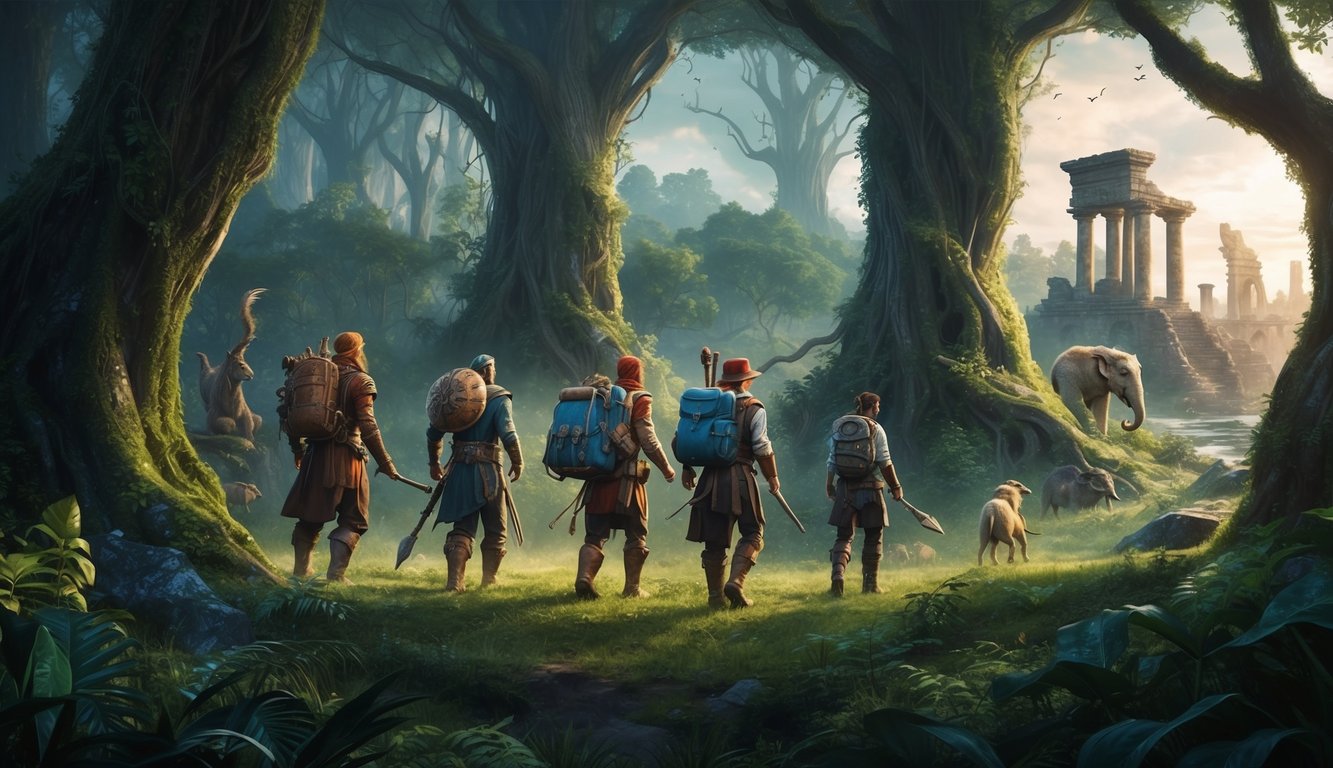
Immersive RPGs transport you into their worlds through rich storytelling and interactive environments.
These games offer deep character connections, engaging quests, and expansive worlds to explore.
The Importance of Companions and NPCs
Your companions and the NPCs you meet can make or break an RPG experience.
Well-written characters with distinct personalities and backstories help bring the game world to life.
In games like “Mass Effect” and “Dragon Age: Origins,” your companions react to your choices and develop relationships with you over time.
This creates a sense of camaraderie and investment in their stories.
NPCs with unique dialogue and quests add depth to the world.
When shopkeepers remember your past interactions or townsfolk gossip about recent events, it makes the setting feel more alive and responsive to your actions.
Quest Design and Side Activities
Engaging quests and side activities keep you invested in the game world.
The best RPGs offer a mix of main story missions and optional content that expands the lore and your character’s abilities.
Side quests in games like “The Witcher 3” often tell compelling stories that rival the main plot.
These can range from humorous diversions to tragic tales that shed light on the game’s themes.
Activities like crafting, mini-games, and collectible hunts provide variety and encourage exploration.
When done well, they feel like natural extensions of the world rather than busy work.
Open World Structures and Secrets
Open worlds in RPGs give you the freedom to chart your own course and uncover hidden stories.
Games like “Skyrim” and “Red Dead Redemption 2” excel at creating vast landscapes filled with secrets to discover.
You might stumble upon a hidden cave containing ancient artifacts, or overhear a conversation that leads to an unexpected adventure.
These moments of discovery make the world feel larger and more mysterious.
Environmental storytelling through notes, items, and visual details rewards observant players.
Piecing together the history of an abandoned ruin or solving a local mystery adds depth to your exploration.
The Evolution of RPGs
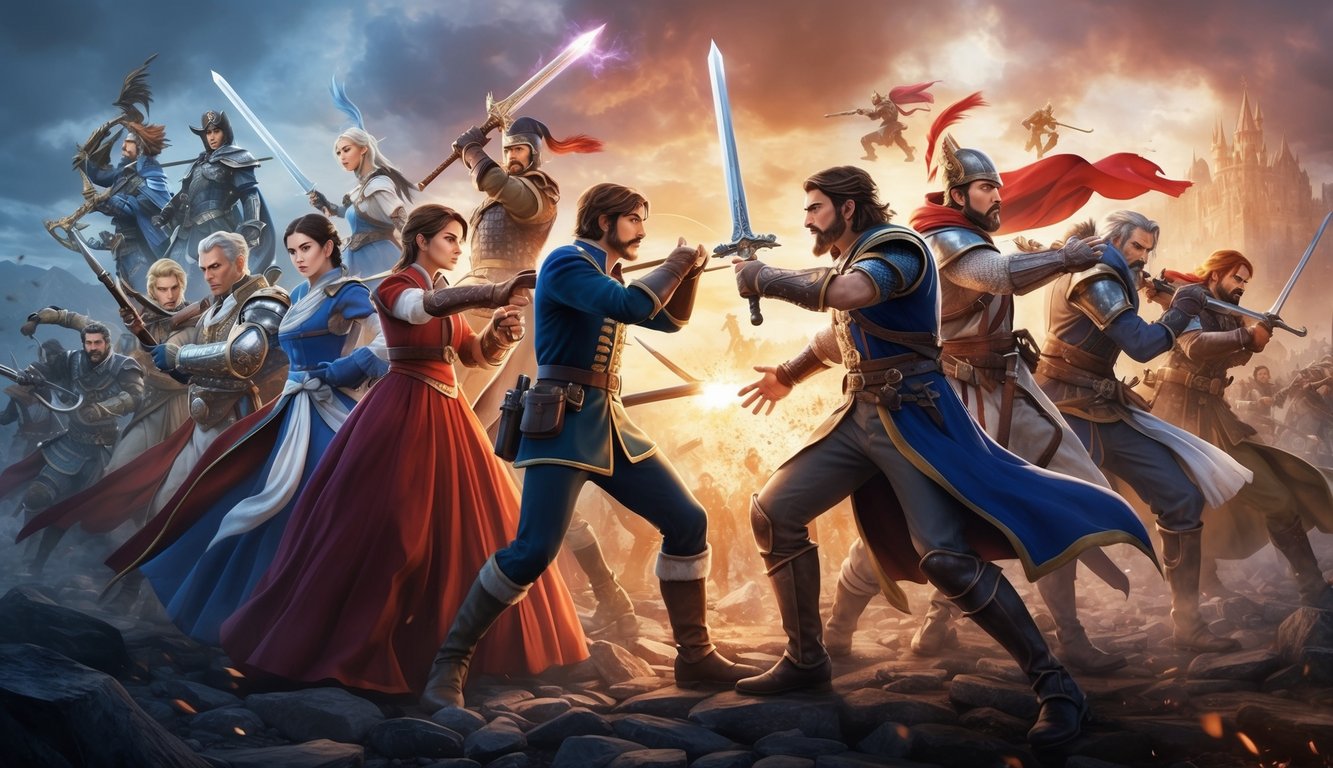
Role-playing games have undergone a remarkable transformation since their inception.
You’ve witnessed their journey from tabletop adventures to immersive digital experiences, with each milestone shaping the genre we know today.
From Tabletop to Digital
Remember those nights huddled around a table, rolling dice and imagining fantastical worlds? That’s where it all began. Dungeons & Dragons kicked things off in 1974, introducing you to character sheets and dungeon masters.
As computers entered homes, RPGs found a new playground.
Suddenly, you could explore digital dungeons in Wizardry (1981) and Ultima (1981).
The shift brought new possibilities.
No more manual calculations – computers handled the math.
Graphics, though primitive, gave faces to monsters you once only imagined.
Early digital RPGs like The Black Onyx (1984) paved the way for more complex systems and storytelling.
Milestones in RPG History
You’ve seen RPGs grow by leaps and bounds. Final Fantasy (1987) showed you epic narratives could unfold on your TV screen.
Baldur’s Gate (1998) brought the depth of tabletop D&D to your computer with a bang.
The genre kept evolving.
Mass Effect (2007) let you shape galactic history with your choices.
The Witcher 3 (2015) dropped you into a vast, morally gray world where your decisions mattered.
MMORPGs like World of Warcraft (2004) connected you with millions of other players.
Indie gems like Undertale (2015) proved RPGs could still innovate and surprise you.
Each breakthrough expanded what RPGs could be, giving you new ways to role-play and explore fantastic worlds.
Impactful Game Settings
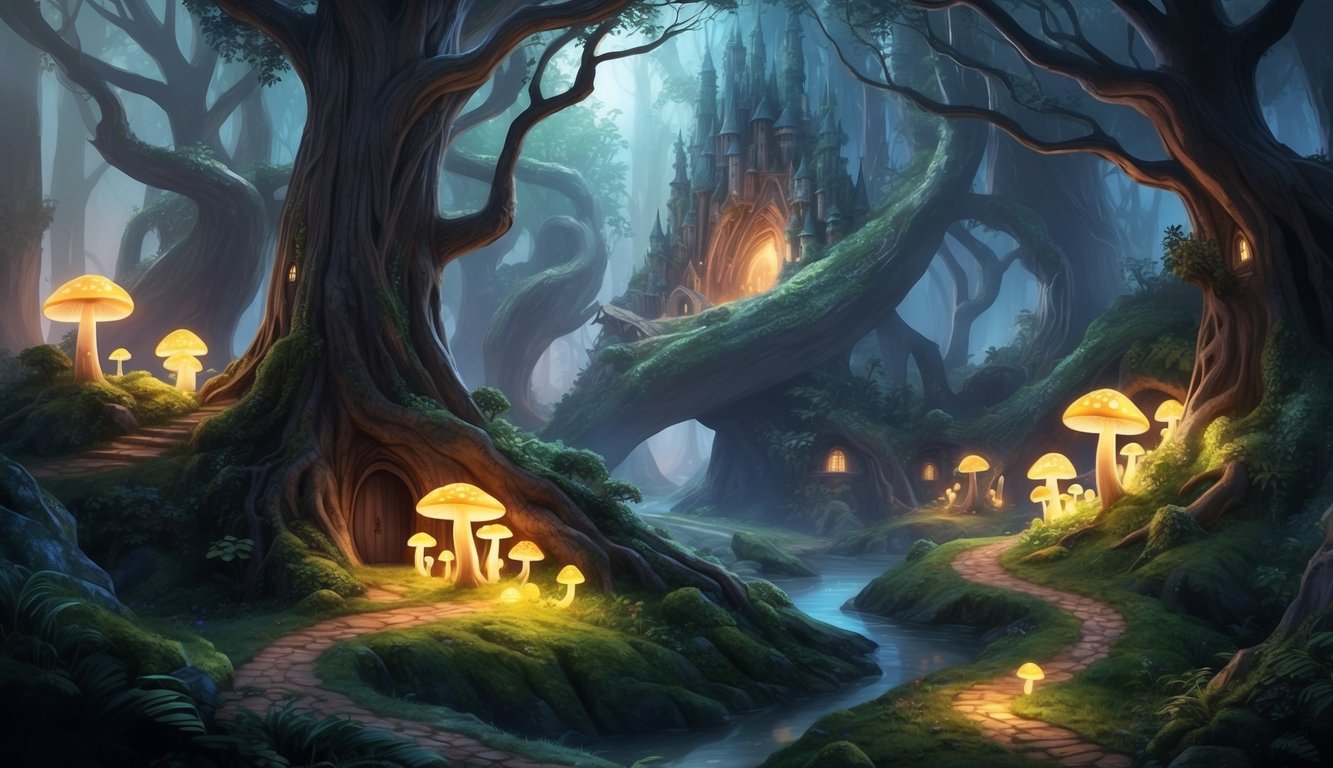
Game settings shape your RPG experience, immersing you in fantastical realms or bringing fantasy elements into familiar worlds.
These environments provide the backdrop for your adventures and influence gameplay in profound ways.
Iconic Worlds and Universes
Night City in Cyberpunk 2077 stands out as a vibrant, neon-soaked metropolis.
You’ll explore its gritty streets, towering skyscrapers, and seedy underbelly.
The city feels alive, with each district offering unique challenges and opportunities.
Skyrim’s vast, rugged landscape invites you to lose yourself in its snowy peaks and ancient ruins.
You can spend hours wandering the tundra, stumbling upon hidden caves or encountering fearsome dragons.
Dragon Age: Origins presents a rich, dark fantasy world steeped in lore.
You’ll traverse diverse regions, from lush forests to imposing fortresses, each with its own history and conflicts.
Real and Fantasy Integrations
Some RPGs blend real-world elements with fantasy, creating unique and relatable settings.
You might find yourself in a modern city where magic exists alongside technology, or in a historical period with supernatural twists.
These integrated settings often allow for more creative storytelling.
You could be battling mythical creatures in the streets of Tokyo or uncovering ancient artifacts in a reimagined Victorian London.
Such blended worlds can make the fantastical feel more grounded and accessible.
They challenge you to imagine how magic or advanced technology might reshape familiar environments and social structures.
Upcoming and Anticipated Releases
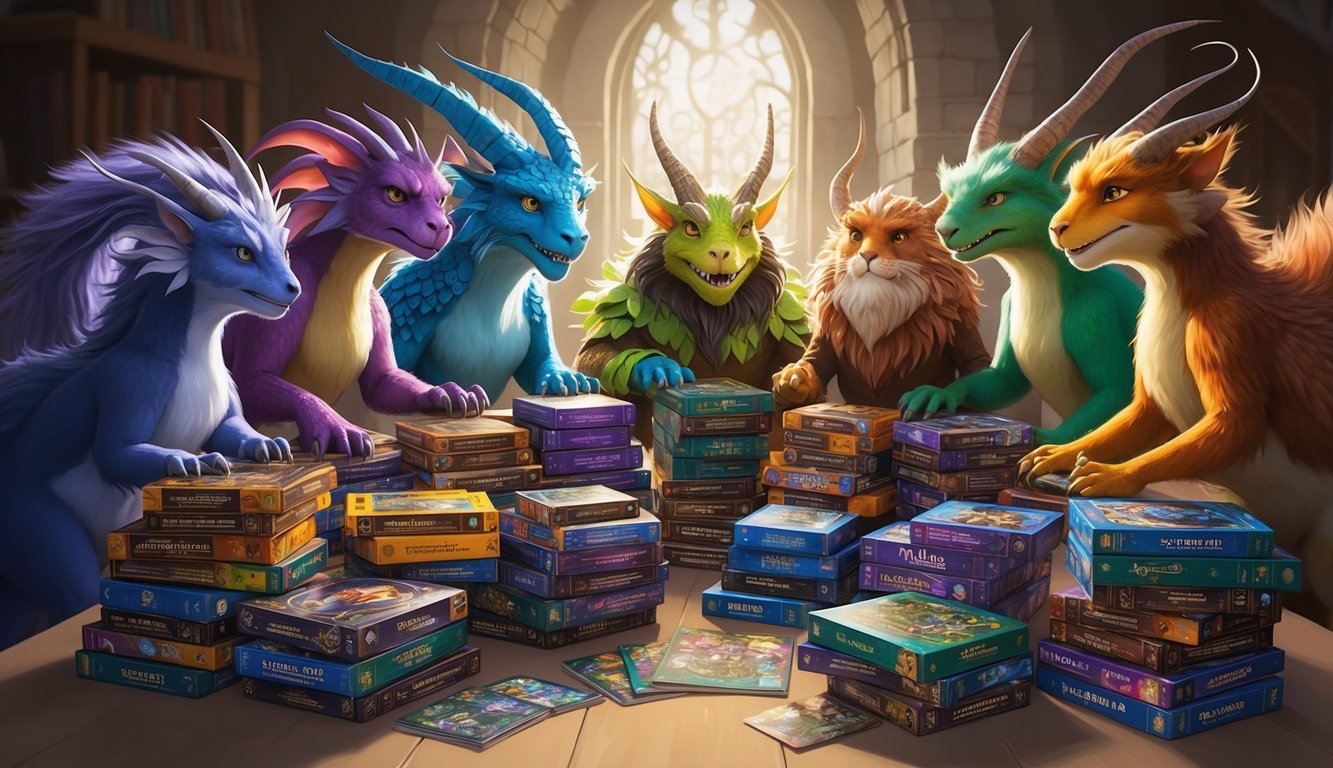
The RPG landscape in 2024 is shaping up to be exciting, with fresh titles and beloved franchises making a comeback.
You’re in for a treat with innovative gameplay mechanics and expanded worlds to explore.
Breaking New Ground with Upcoming Titles
“In Stars and Time” offers a unique time-looping RPG experience.
You’ll uncover mysteries as you replay events, making different choices each cycle.
“Titan Quest” brings ancient mythology to life in a new installment, letting you battle legendary creatures across expansive maps.
“Final Fantasy 7 Rebirth” continues the reimagining of the classic, promising stunning visuals and an expanded storyline.
You’ll revisit familiar locations with fresh perspectives and engage in updated combat systems.
Sequels and Expansions to Existing Franchises
“Dragon’s Dogma 2” builds on its predecessor’s innovative pawn system.
You’ll command AI companions in a vast open world, facing formidable foes and unraveling an epic tale.
“Diablo 4” brings the dark fantasy series into a shared world.
You’ll team up with friends to tackle dungeons and world events, with regular updates promised post-launch.
A new “Mass Effect” title is in development, though details are scarce.
You can expect to explore new galaxies and forge alliances with diverse alien species.
Role-Playing Games in Popular Culture

RPGs have profoundly shaped entertainment and fostered vibrant fan communities.
Their storytelling elements and immersive worlds continue to inspire other media and fuel creative expression among players.
RPG Influence on Media and Entertainment
You’ve probably noticed RPG elements creeping into movies, TV shows, and books.
Games like “Dungeons & Dragons” have inspired countless fantasy stories.
The choose-your-own-adventure style of RPGs has influenced interactive Netflix specials.
Video game RPGs like “Final Fantasy” and “The Elder Scrolls” have expanded into novels, comics, and animated series.
RPG mechanics have even seeped into non-RPG video games.
You’ll find leveling systems, character customization, and dialogue choices in shooters, sports games, and more.
This widespread adoption shows how deeply RPGs have impacted modern entertainment.
Community and Fan-Driven Content
Player creativity thrives in RPGs.
You’ll find amazing fan-made content everywhere.
Online forums burst with homebrew rules and custom character classes.
Passionate players also create entirely new game systems.
Fan art brings beloved RPG characters to life.
You’ll spot intricate cosplay at conventions and stunning digital illustrations shared on social media.
Some fans even produce their own RPG podcasts and web series, like “Critical Role.”
Many of the best RPGs embrace this creativity.
Games like “Neverwinter Nights” and “Divinity: Original Sin 2” include powerful modding tools, letting you create and share your own adventures.

